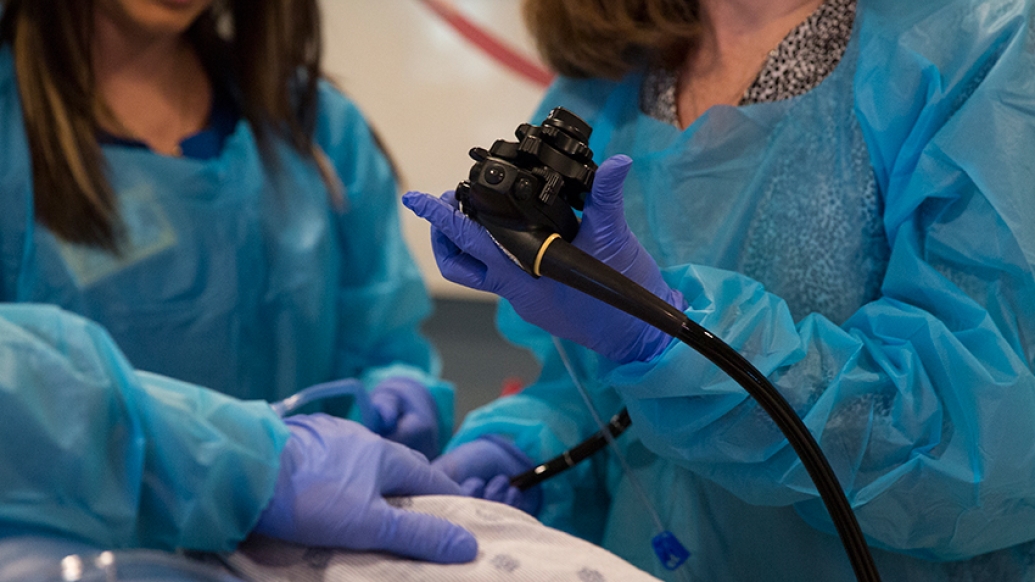An updated recommendation from the American Cancer Society lowers the age to begin routine screening for colorectal cancer to 45.
12:22 PM
Author |

Thinking you could wait till your 50th birthday to worry about colorectal cancer? Maybe not.
New guidelines from the American Cancer Society recognize recent studies that have found increasing rates of colorectal cancer among younger people. In response, they lowered the recommended age to begin screening from 50 to 45.
LISTEN UP: Add the new Michigan Medicine News Break to your Alexa-enabled device, or subscribe to our daily audio updates on iTunes, Google Play and Stitcher.
"Research from our institution and others confirms that colon and rectal cancer are the fastest growing cancer types among people under age 50," says colorectal surgeon Karin Hardiman, M.D, Ph.D.
Hardiman, surgical director of the Rogel Cancer Center's Multidisciplinary Colorectal Cancer Clinic, cites a recent study cautioning that early onset colorectal cancer also tends to be more advanced when diagnosed and more likely to involve the rectum.
"We regularly see younger patients who have never had a colonoscopy, despite symptoms of more advanced disease like bleeding. Earlier screening might have detected their cancers before they experienced symptoms. For prevention, we know that colonoscopy, which identifies suspicious polyps and guides their removal, prevents about 90 percent of colorectal cancers," she says.
Regardless of the recommended screening age, anyone with worrisome symptoms, such as bleeding, pain or changes in bowel habits, should talk with their doctor about further evaluation with colonoscopy.
See also: Should Young People Get a Colon Cancer Screening? It Depends on Their Risk
"The important message is that people should have a conversation with their doctor about their family history of cancer to examine their risk for colorectal cancer and determine the best age to start screening," says Elena Stoffel, M.D., MPH, assistant professor of internal medicine at the Michigan Medicine and director of the Cancer Genetics Clinic at the Rogel Cancer Center.
MORE FROM MICHIGAN: Sign up for our weekly newsletter
These individuals are considered at higher risk for colorectal cancer and should talk with their doctor about screening with colonoscopy before age 50.
- A personal history of colorectal cancer or certain types of polyps
- A personal history of inflammatory bowel diseases
- A family history of colorectal cancer
- A confirmed or suspected hereditary colorectal cancer syndrome
- A personal history of radiation to the abdomen or pelvic area to treat a prior cancer
Screening recommendations
Adults at average risk of colorectal cancer should undergo regular screening with either a high‐sensitivity stool‐based test or a structural (visual) examination, depending on patient preference and test availability.
Screening options include:
- Fecal immunochemical test – annually
- High‐sensitivity, guaiac‐based fecal occult blood test – annually
- Multitarget stool DNA test – every three years
- Colonoscopy – every 10 years
- Computed tomography colonography – every five years
- Flexible sigmoidoscopy – every five years
All positive results from screening tests other than colonoscopy should be followed up with timely colonoscopy.
Additional American Cancer Society recommendations:
- Average‐risk adults in good health with a life expectancy of more than 10 years continue screening through age 75
- Screening decisions for average-risk individuals ages 76-85 should be based on patient preferences, life expectancy, health status and prior screening history
- Individuals older than age 85 at average risk for colorectal cancer do not need screening
For questions about colorectal cancer screening or to schedule an appointment, call the Cancer AnswerLine at 800-865-1125.

Explore a variety of healthcare news & stories by visiting the Health Lab home page for more articles.

Department of Communication at Michigan Medicine
Want top health & research news weekly? Sign up for Health Lab’s newsletters today!





